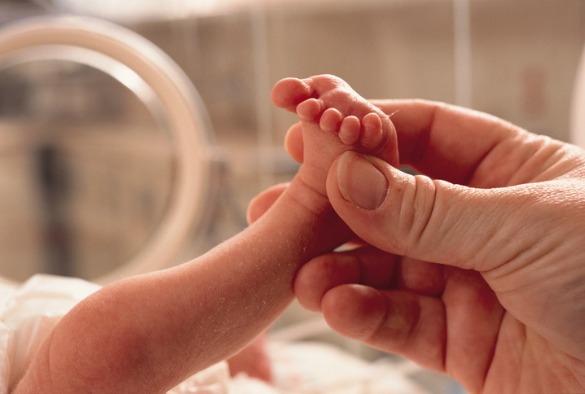
Psychology Lecturer Dr Vicky Fallon from the Institute of Psychology, Health and Society, writes about postnatal anxiety being under-recognised, over-shadowed and misrepresented:
“If you were to ask the vast majority of mothers what comes to mind when they think about postnatal mental health problems, the first word out of their mouths would be “postnatal depression”. Everyone has heard of postnatal depression. It’s a common problem, affecting more than 1 in every 10 women within a year of giving birth, and it is predominately characterised by a persistent feeling of sadness, loss of interest, and lack of energy.
A quick internet search of “postnatal depression UK” pulls up around one million pages of information. The NHS, Royal College of Psychiatrists and Mind top the hits; providing accessible and evidence based advice for prospective and new mothers. Health professionals are advised by policy to ask brief questions to new mothers to identify possible depression after birth. If mothers are at risk, there is a more comprehensive questionnaire (The Edinburgh Postnatal Depression Scale) designed specifically to screen postnatal women for the condition. As a result, mothers are generally knowledgeable, vigilant, and in a good position to seek treatment if the signs and symptoms of postnatal depression arise.
However, through my research with postnatal women it is another, under-recognised aspect of postnatal mental health that I hear about just as frequently as depression. Many of the mothers I have worked with share their experiences of “worry”, “concern” and “anxiety”. Childbearing, as a period of substantial biological and psychosocial change, can be expected to elicit some anxiety. It acts as an adaptive strategy that occurs in response to perceived danger and prepares an individual to cope with the environment. This can serve to protect the baby and help a mother to cope with the unpredictable nature of the postnatal period. However, there is a tipping point.
When anxiety becomes irrational or excessive, and results in emotional and physical discomfort that affects day to day life, it is thought of as abnormal and pathological. Even at sub-clinical levels, research has demonstrated that postnatal anxiety is linked to a range of negative outcomes for mother and baby.
In terms of the mother, those with postnatal anxiety are less sensitive towards their infants and feel like they cannot cope as well with their babies. Furthermore, their babies are at a higher risk of insecure attachment, delayed cognitive development, and lower social engagement.
Whilst postnatal depression and anxiety can co-occur, research studies examining postnatal anxiety demonstrate that it does also occur independently and at higher rates than postnatal depression. However, there is little information available to reflect this.
The same internet search for “postnatal anxiety UK” pulls up a quarter of the results that were generated for postnatal depression. Worryingly, the NHS and NICE do not recognise postnatal anxiety as a distinct disorder, and consequently there is no current guidance which exclusively addresses postnatal anxiety for either health professionals or mothers. With depression and anxiety being comorbid it could be expected that there would be some information embedded within the postnatal depression literature.
However, the NHS website for postnatal depression makes no reference to anxiety whatsoever.
This under-recognition is echoed in the way that we currently identify the frequency and severity of symptoms of postnatal anxiety. The brief questions that health professionals use for postnatal depression have no mention of anxiety. Until very recently, there was also no questionnaire designed to examine anxieties that occur in the months following childbirth. Instead, questionnaires that have been designed for non-childbearing populations are used in the majority of research studies. Items within these measures are not always relevant to the postnatal period and may provide inaccurate results.
Through our work and that of others, we have identified different components of postnatal specific anxiety that would not be applicable in non-childbearing woman. These anxieties can be grouped into issues around parenting competence, attachment, infant wellbeing, day to day care, and social relationships. We have since developed a new questionnaire (The Postpartum Specific Anxiety Scale) to reflect the anxieties that women commonly face in the postnatal period. Our research shows that the questionnaire reliably and accurately identifies women with a clinical diagnosis of anxiety, but it still needs more work before it can be implemented as a screening tool in the UK.
The current deficits in information and screening of postnatal anxiety raise a number of concerns. Mothers’ who are both anxious and depressed, could only be diagnosed with depression. Mothers with pure anxiety may be misdiagnosed with depression. Even worse, there is potential for both mother and health professional to assume that mothers are functioning normally as they are not depressed. All of these scenarios delay or prevent the appropriate management and treatment of symptoms of anxiety which may have serious consequences for both the mother and baby.
The evidence base for postnatal anxiety is starting to grow, but what should mothers know in the meantime? First, mothers should be aware that symptoms of anxiety can present both alongside and independently of depression and are often mislabelled as postnatal depression. Mothers should seek professional help if their quality of life or their experience of motherhood is being compromised, even if their symptoms do not correspond with those of postnatal depression. Finally, mothers may also benefit from understanding that symptoms of anxiety in the postnatal period may not be the same as anxieties occurring at other times of life; often they are solely specific to the mother and baby.
Ultimately, we need to make sure that mothers are aware of the condition, and that health professionals identify and screen for postnatal anxiety in the same manner as postnatal depression.”
This article was originally published on Mumsnet. To read the original article please click here.